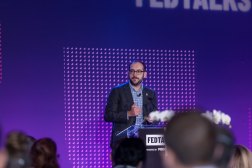FedScoop: Recent initiatives like the U.S. Digital Service and 18F have been tackling that very problem – working on bringing a fresh perspective to government and doing things differently. Do you think young people can bring that innovative look that can change the way government works?
Joel Mulligan: Oh, definitely. I think DHS has some things where they pull them in from the Scholarship for Service’s CyberCorps and that’s the thing to do. [We need to] pull people in by starting the processes while they are still in school and still have time left. Get them in as they’re coming out [of school] and that kind of negates what I was talking about earlier with that whole waiting process. But most people coming out, especially with the high cost of college nowadays, they can’t wait a year, they can’t do it. Not working is not an option for many millennials, and that doesn’t work with the way the government needs to do it for security reasons. It’s difficult.
FS: What do you think makes this generation of young people different than the generation that came before it?
JM: I think this generation has had access to information. I think that’s the main thing. If you think about it – and I’m just on the cusp of being a millennial, or being a youth, I’m 29 years old, I’m right on the edge, and I remember when there was no Internet. I was a late starter in school because I was in the Marine Corps, but most of the people I knew through school, through the fraternities I was in, they can’t imagine a world without the Internet, a world without constant information. I think that’s the big difference between how millennials and other generations. Their access to all this information has molded them into different people, but it also brings a bunch of new perspectives. [Millennials are] much quicker at things, I’d say.
FS: Let’s talk about your daily life at DHS. What does a typical day look like for you?
JM: Well, I just recently moved and the commute’s great. It doesn’t take me very long. I get on the Metro at about 7 a.m., I come in, I get in at about 7:30 a.m., before 8 a.m. at the latest, and depending on what I have on my plate, I either set up meetings or send a million emails or start working on whatever I’m doing. Right now, I’m doing policy stuff, so that involves a lot of writing and a lot of research. So, I’m either in too many meetings or I am writing a lot.
FS: When you’re doing policy research, obviously it’s more than a simple Google search. What other types of tools do you use to gather the information you need?
JM: It’s interesting. Google does play a small role, and then I also use LexisNexis for academic papers, that’s a pretty good avenue. Most agencies have a list of resources that you can go to to help you out, because a lot of that stuff isn’t published. FEMA for instance has a list of specified resource areas that you can go to and request information.






